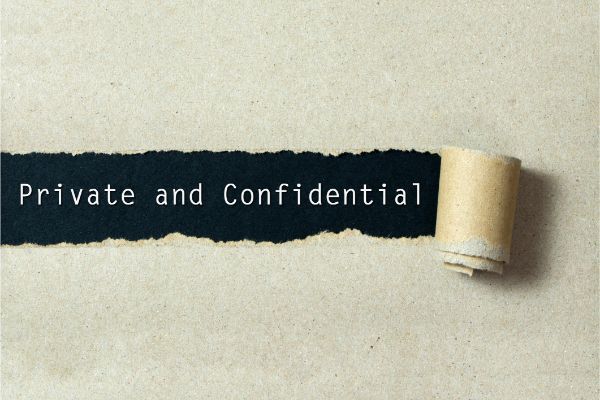Attorney-Client Privilege And Client Confidentiality

As law students prepare for graduation, certain questions that relate to legal ethics and professional responsibility become more prevalent in their minds. These practical considerations are of equal importance to any other aspect of a law firm’s practice. Like substantive legal rules, they require the strict adherence of all licensed attorneys. An important question relates to protecting client confidentiality. After all, most attorneys like to talk.
On one hand, there is the attorney-client privilege which, of course, contains a facet of confidentiality. This is what law students learn about in professional responsibility class as they study the ethical rules, including RC 1.6. On the other hand, there is simply the idea of keeping business and client matters private. Other clients sitting in the waiting room do not need to hear the various conversations between attorney, client, and staff. It is just a matter of simple privacy and discretion rather than the attorney-client privilege that attorneys protect the privacy of their interactions between themselves and clients.
The attorney-client privilege is a hallmark of the legal profession as it encourages clients to be open and honest with counsel without fear that others may become privy to and judge the substance of these conversations. Perhaps more importantly, attorneys who are fully informed by clients are in the best position to provide the best legal advice. Attorneys must advise clients to the best extent possible while maintaining confidentiality and protecting the attorney-client privilege. If there is any possibility of litigation, the protection provided for an attorney’s work product in the Federal Rules of Civil Procedure may afford protection that the attorney-client privilege may not provide.
Communications will only be privileged if the party sought, and the attorney rendered, legal advice. Because the privilege is contrary to the judicial goal of bringing relevant evidence forward, the privilege is narrowly construed and protects only those disclosures necessary to obtain informed legal advice that may not have been rendered absent the privilege.
The privilege does not protect communications in situations where an attorney serves the client solely as a business advisor. However, attorneys who provide clients with advice on both business as well as legal matters, it is not always clear whether an attorney has, in fact, rendered legal advice. If the advice is something that could have been given by an individual with no legal training, the attorney has not been consulted in a professional capacity. Under the totality of the circumstances, the attorney’s guidance must have been sought because of a need for legal advice.
No client wants to ask his or her attorney if they could have a quieter conversation and hear the attorney respond, “It’s ok, what we’re discussing isn’t privileged.” The simplest solution and one that is discrete, respectful, and provides the most protection is to treat every communication and interaction as private and confidential.
To comply with the confidentiality requirements of RPC 1.6, among other actions, attorneys must ensure that their offices are arranged so that client consultations may be conducted with complete privacy. Client files must be kept in a secure area and should only be accessible to authorized personnel.
It may not be all that difficult for an attorney to consistently protect the privacy of any client matters. He or she knows what is at stake and the extreme responsibility inherent in the relationship. However, staff members may be more careless and prone to neglectful disclosure based on their personalities and maturity levels.
Attorneys must instruct and train staff to be constantly aware of the necessity to be discrete and sensitive to issues of confidentiality in all phases of working on a client’s legal matter. Staff must not discuss client matters in public areas such as the reception area and must be discrete when answering the phone and taking messages to avoid being overheard.
Adopt the simple solution: Treat every communication and interaction as private and confidential.
If you are interested in becoming an exceptional legal advocate, consider the benefits of the California Desert Trial Academy. As a member of CDTA’s growing family, you’ll receive access to our student and alumni attorneys, who freely and openly share their legal experiences, career advice, and academic tips. Call us today at (760) 342-0900 or find out more online here.


